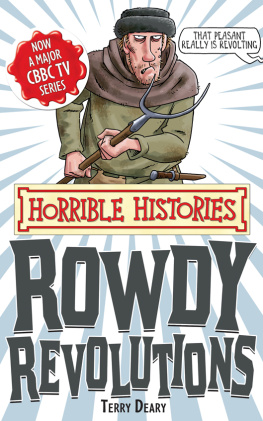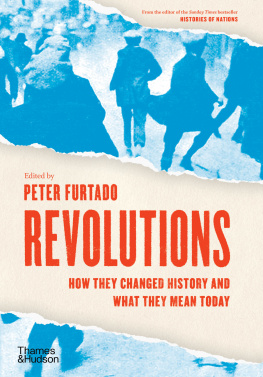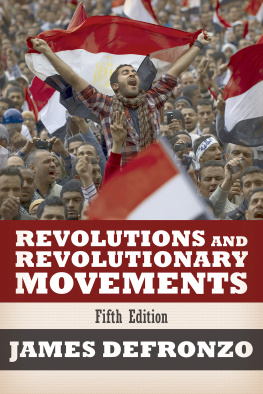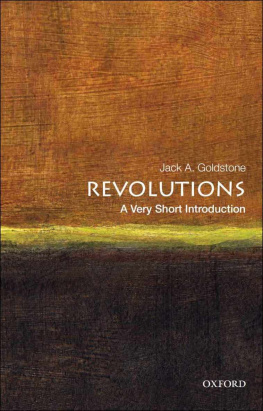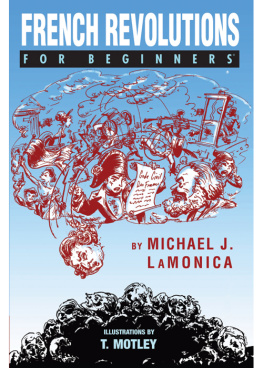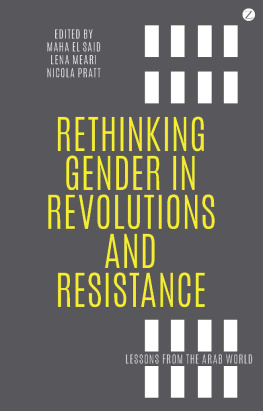Scripting Revolution
A Historical Approach to the Comparative Study of Revolutions
Edited by
Keith Michael Baker and Dan Edelstein
Stanford University Press
Stanford, California
Funding for this volume was made possible thanks to generous support from The Europe Center at the Freeman Spogli Institute for International Studies
Stanford University Press
Stanford, California
2015 by the Board of Trustees of the Leland Stanford Junior University
Printed in the United States of America on acid-free, archival-quality paper
Library of Congress Cataloging-in-Publication Data
Scripting revolution : a historical approach to the comparative study of revolutions / edited by Keith Michael Baker and Dan Edelstein.
pages cm
Includes bibliographical references and index.
ISBN 978-0-8047-9396-4 (cloth : alk. paper)
ISBN 978-0-8047-9616-3 (pbk. : alk. paper)
1. RevolutionsHistory. I. Baker, Keith Michael, editor. II. Edelstein, Dan, editor.
JC491.S38 2015
321.09'4dc23
2015005110
ISBN 978-0-8047-9619-4 (electronic)
Typeset at Stanford University Press in 10/13 Galliard
Acknowledgments
The editors would like to thank the following entities at Stanford University for their support: The Europe Center at the Freeman Spogli Institute for International Studies; the School of Humanities and Sciences; the Division of Literatures, Cultures and Languages; the Department of History; the Stanford Humanities Center; and the France-Stanford Center for Interdisciplinary Studies. They are also grateful to Andrew Schupanitz for his editorial assistance.
Contents
KEITH MICHAEL BAKER AND DAN EDELSTEIN
TIM HARRIS
DAVID R. COMO
DAVID ARMITAGE
KEITH MICHAEL BAKER
JACK RAKOVE
DAN EDELSTEIN
GUILLAUME MAZEAU
MALICK W. GHACHEM
GARETH STEDMAN JONES
DOMINICA CHANG
CLAUDIA VERHOEVEN
IAN D. THATCHER
JEFFREY WASSERSTROM AND YIDI WU
ALEXANDER C. COOK
LILLIAN GUERRA
JULIAN BOURG
ABBAS MILANI
SILVANA TOSKA
DAVID A. BELL
Introduction
KEITH MICHAEL BAKER AND DAN EDELSTEIN
Is this a revolution? Shortly after massive popular protest in Egypt on 25 January 2011 unleashed the flood of events that would sweep Hosni Mubarak from the presidency, an interviewer put this question to a principal Internet animator of the uprising, Google employee Wael Ghonim. He thought briefly before proclaiming the advent of Revolution 2.0.
Ghonim repeated this formulation frequently in interviews during the following days and in the fascinating memoir, Revolution 2.0, he published a year later. Revolutions of the past have usually had charismatic leaders who were politically savvy and sometimes even military geniuses, he concluded in this book. Such revolutions followed what we can call the Revolution 1.0 model. But the revolution in Egypt was different: it was truly a spontaneous movement led by nothing other than the wisdom of the crowd. This Revolution 2.0, Ghonim wanted to insist, was essentially leaderless: no one was the hero because everyone was the hero. It was like an offline Wikipedia, with everyone anonymously and selflessly contributing efforts toward a common goal.
One has to say that Ghonims characterization of Revolution 1.0 is as radically attenuated as the accompanying conceptualization of Revolution 2.0 is thin. But his title, and the events unleashed by the Arab Spring, invite us to think again about the longer history of the revolutionary tradition. To speak of Revolution 2.0 suggests a significant revision of an ongoing project, an upgrading of a revolutionary program through conceptual elaboration and technical innovation. Clearly, the Internet has placed an immensely more powerful technology of communication in the service of social and political change. But has the conceptualization of revolution been updated along with the technology? Has Facebook revolutionized revolution itself? To consider this question, we need to think about revolution again. This volume of essays proposes to do so by exploring the possibilities of a new historical approach to the comparative study of revolutions.
Approaching Revolution as Script
Until now, a curious division of labor has prevailed among scholars of revolution. Historians have mostly studied revolutions as distinct and separate events, leaving the comparative study of revolutions to sociologists and political scientists. Methodologically, these two approaches to revolution could hardly be more opposed. Where historians emphasize the specificity of historical context, social scientists point to comparable structural social and institutional imbalances in their analyses. Historians such as William Sewell and Martin Malia have long pointed out the flaws with the sociological analysis of comparative revolutions. But historians have been reluctant to propose an alternative method, in large part because the comparative study of revolutions requires a close familiarity with many different cultures, languages, and historical traditions.
The guiding insight of the essays in Scripting Revolution is that at least one feature of revolutions transcends these cultural differencesand this is the notion of a revolutionary script. Revolutions do not occur ex nihilo. Revolutionaries are extremely self-conscious of (and often highly knowledgeable about) how previous revolutions unfolded. These revolutionary scripts offer frameworks for political action. Whether they serve as models or counterexamples, they provide the outlines on which revolutionary actors can improvise. And revolutionaries, in turn, can transform the scripts they inherit. Marx rewrote the script of the French Revolution; Lenin revised Marx; Mao revised Lenin; and so on and so forth.
It is our contention that an historical approach of this kind is better suited than a sociological method to reveal the similarities (and differences) between revolutionary origins and outcomes. To advance this claim, and to address the added difficulty of navigating between different linguistic and cultural traditions, we have assembled a group of leading historians to explore how the revolutions on which they are experts modeled themselves onor actively transformedpreexisting revolutionary scripts.
To take the notion of script in its fairly straightforward literary or dramatic sense, we might say that a script creates a situation and sets out the manner of its unfolding. It requires the setting of a scene and the characterization of those acting within it, in relationship one to another and to the situation more broadly construed. Its initial definition of the situation implies a narrative (or possible narratives) to be enacted in subsequent scenes, which in turn introduce actions and events that offer its characters choices among possible courses of action. A script, in other words, constitutes a frame within which a situation is defined and a narrative projected; the narrative, in turn, offers a series of consequent situations, subject positions, and possible moves to be enacted by the agents within that frame. Once known and enacted, the script can be replayed indefinitely; but it can also be changed, adapted, or even subverted by the introduction of new events, characters, or actions. The actorsor even the audiencecan take over the stage.
In politics, as in the theater or on the screen, scripts generate events. They do so in the obvious sense that a script suggests positions to be taken, actions to be carried out, incidents to be anticipated. They do so, less obviously, in the sense that positions that have been taken, actions that have been carried out, or incidents that have occurred are necessarily configured (or reconfigured) to give them meaning within a scriptor within competing scripts. They do so, further, as scripts thus become subject to interpretation or improvisation, leading to conflicts among those competing to define and enact their own claims in relation to a particular script, or to resist the characterizations forced upon them within a script imposed by others. Competition to impose a script, or to control a script that has been imposed, is a fundamental fact of politics, though perhaps never more in evidence than in a situation that has been declared revolutionary.
Next page

